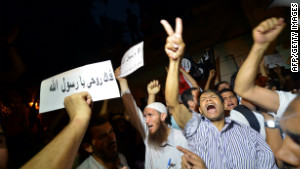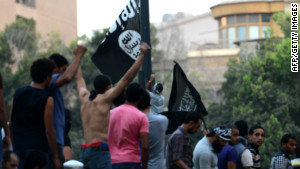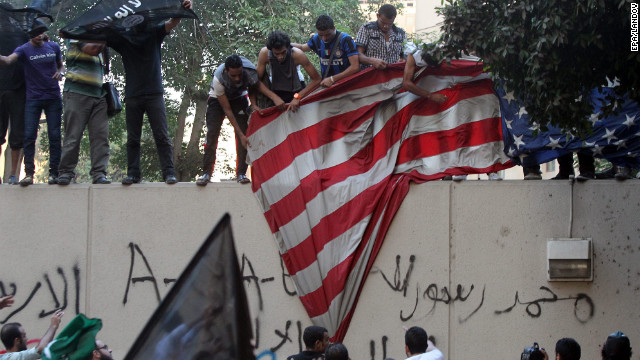September 12, 2012 -- Updated 0150 GMT (0950 HKT)
STORY HIGHLIGHTS
- NEW: Libyan lawmakers condemn the Benghazi attack
- NEW: Townsend: It is unclear whether the attacks in Egypt and Libya were coordinated
- Angry protesters attack U.S. diplomatic compounds in Egypt and Libya
- Employee at U.S. Consulate in Benghazi killed, Libyan government says
In Cairo, several men
scaled the walls of the U.S. Embassy and tore down its American flag,
according to CNN producer Mohamed Fadel Fahmy, who was on the scene.
In Libya, witnesses say
members of a radical Islamist group called Ansar al-Sharia protested
near the U.S. Consulate in Benghazi, where NATO jets established no-fly
zones last year to blunt ground attacks from then Libyan strongman
Moammar Gadhafi.
The group then clashed with security forces in the city, blocking roads leading to the consulate, witnesses said.
The Libyan government
notified the United States that an employee at the U.S. Consulate was
killed, a State Department official told CNN.
The State Department does
not have independent confirmation of the death, the official said. The
nationality of the worker was not immediately known.
Libya's General National
Conference condemned the attack, saying it "led to the regrettable
injury and death of a number of individuals." Lawmakers said in a
statement Tuesday night that they were investigating.
 Middle East attacks against U.S.
Middle East attacks against U.S.
It was unclear whether the two attacks were coordinated, CNN national security contributor Fran Townsend said Tuesday night.
 Protesters storm U.S. embassy walls
Protesters storm U.S. embassy walls
"One such breach of an
embassy or consulate's walls or security on any given day would be
tremendous news. ... The fact that two of them happened on the same day
that is the 9/11 anniversary where Americans are remembering those that
we lost, you have to ask yourself, what are American officials trying to
understand about this and whether or not these two are related?" she
asked.
In Egypt, police and
army personnel formed defensive lines around the U.S. Embassy in an
effort to prevent demonstrators from advancing, but not before the
protesters affixed a black flag atop a ladder in the American compound.
The black flag, which
hangs in full view from inside the complex, is adorned with white
characters that read, "There is no God but Allah and Mohammed is his
messenger," an emblem often used by Islamic radicals.
A volley of warning
shots were fired as a large crowd gathered around the compound, although
it is not clear who fired the shots.
Egyptian groups point to
U.S. websites, including YouTube, that have scenes from the film. Some
anti-Muslim blogs also have flagged the movie.
In a series of disjointed scenes, filmmakers depict Prophet Mohammed as a child molester, womanizer and ruthless killer.
Most of the Muslim world considers depictions of Mohammed to be blasphemous and deeply offensive.
It was not clear late Tuesday who produced the film and under what auspices.
Embassy officials issued
a warning to Americans in Egypt, telling them to avoid the
demonstrations which "may gather in front of the U.S. Embassy, or
Egyptian government buildings such as the People's Assembly and Ministry
of Interior."
"It is unclear if large
numbers will take to the streets, but clashes may occur should two
opposing groups come into contact with one another," the U.S. Embassy
said in a statement. "Large gatherings and non-essential travel in and
around downtown and Garden City should be avoided this afternoon."
Frenzied protesters
could been seen Tuesday afternoon holding up bits of a shredded American
flag to television camera crews while chanting anti-U.S. slogans.
An embassy phone
operator told CNN that the compound had been cleared of diplomatic
personnel earlier in the day, ahead of the apparent threat, while
Egyptian riot police and the army were called in.
"This is an expression
of a feeling that is thought to be an insult," said Nizih El Naggary, a
spokesman for the Egyptian Foreign Ministry. "But events like this are
extremely deplorable. And we have to work to get things under control."
The Foreign Ministry
issued a statement Tuesday, pledging to protect embassies and warning of
the protests' potentially debilitating effects on the Egyptian economy.
"There are police forces
at the demonstrations," El Naggary said. "They should be protecting the
embassy and asking people to leave."
Several individuals
claimed responsibility for organizing the demonstrations Tuesday,
including Salafist leader Wesam Abdel-Wareth, who is president of
Egypt's conservative Hekma television channel.
Mohamed al-Zawahiri --
the brother of al Qaeda leader Ayman al-Zawahiri -- added, "We called
for the peaceful protest joined by different Islamic factions including
the Islamicc Jihad (and the) Hazem Abu Ismael movement."
"We were surprised to
see the big numbers show up, including the soccer Ultra fans," he said.
"I just want to say, how would the Americans feel if films insulting
leading Christian figures like the pope or historical figures like
Abraham Lincoln were produced?"
He added that "the film portrays the prophet in a very ugly manner, alluding to topics like sex, which is not acceptable."
The U.S. Embassy in Cairo announced that it had canceled visa services for Wednesday.
It also said in a
statement that it "condemns the continuing efforts by misguided
individuals to hurt the religious feelings of Muslims -- as we condemn
efforts to offend believers of all religions."
"Respect for religious
beliefs is a cornerstone of American democracy," the statement said. "We
firmly reject the actions by those who abuse the universal right of
free speech to hurt the religious beliefs of others."
Demonstrations elicited a
mixture of reactions from the Egyptian street, where last year tens of
thousands turned out in opposition to former Egyptian President Hosni
Mubarak.
This summer, Egypt's
first Islamist president, Mohamed Morsy, was sworn into power at Tahrir
Square, the scene of the nation's revolution in 2011.
Though Tuesday's embassy
protests are the first that Morsy has dealt with, Egypt recently
produced similar scenarios when protesters attacked the Israeli and
Syrian embassies in unrelated episodes.
"These protests are a
bad image for Egypt," said a Cairo street vendor named Ahmed. "Of course
I'm against insulting Islam, but it's the undereducated, poor people
who are out here causing problems."
"All I want for Egypt is security and stability," he said. "And as you can see this isn't it."
The incident occurred on
the 11th anniversary of the 9/11 attacks as crowds gathered across the
United States in somber remembrance of a day that left nearly 3,000
people dead.
Tuesday's focus on the
controversial film also drew comparisons to outcry generated from a 2008
movie produced by an anti-Muslim Dutch lawmaker, which then sought to
portray Islam as a violent religion.
Geert Wilders' film
"Fitna," which he released online, featured images of terrorist acts
superimposed over verses from the Quran.
CNN's Ian Lee in Cairo, Jomana Karadsheh,
Matt Smith, Brian Walker, Elise Labott, Paul Cruickshank and Tracy
Doueiry contributed to this report

No comments:
Post a Comment